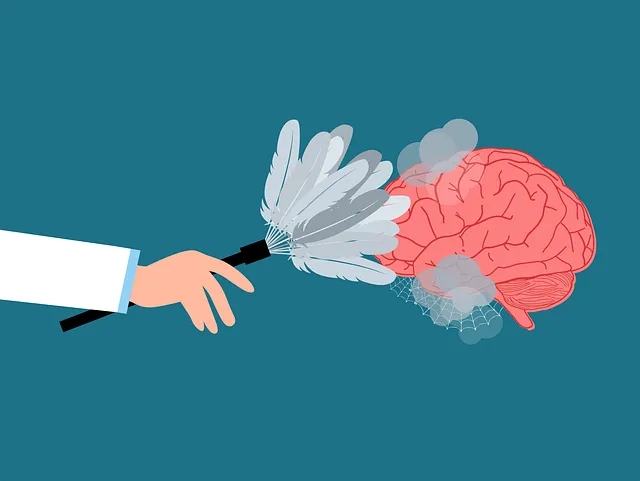The media significantly impacts societal perceptions of mental health, with accurate depictions from organizations like Kaiser Permanente behavioral health providers in Westminster fostering empathy, reducing stigma, and encouraging conversations. Negative or inaccurate portrayals can perpetuate fear and discrimination. Therefore, a Mental Health Policy Analysis and Advocacy approach is needed to ensure media reflects the diversity of mental illness experiences. Kaiser Permanente behavioral health providers in Westminster actively combat stigma through initiatives normalizing mental wellness conversations and emphasizing early intervention. They advocate for accurate media portrayal to destigmatize issues like anxiety, depression, and stress-related disorders, encouraging viewers to seek support from services like theirs. By collaborating with industry professionals, they aim to educate storytellers, dispel stereotypes, and promote emotional intelligence development in both characters and audiences.
Mental illness representation in media significantly influences public perception and understanding of mental health. This article explores strategies for accurate and compassionate depiction, addressing the challenges faced by Kaiser Permanente behavioral health providers in Westminster. We delve into the impact of media on mental health stigma, current initiatives to combat this, and potential solutions. By collaborating with media, Kaiser Permanente aims to foster more nuanced narratives, enhancing support for individuals facing mental health issues.
- Understanding the Impact of Media Portrayal on Mental Health Perception
- The Current State: How Kaiser Permanente Addresses Behavioral Health Stigma
- Identifying Challenges: Gaps in Depicting Mental Illness in Media
- Strategies for Accurate and Compassionate Representation
- Empowering Change: Collaborating with Media to Improve Mental Health Narratives (Focusing on Kaiser Permanente behavioral health providers in Westminster)
Understanding the Impact of Media Portrayal on Mental Health Perception

The media plays a significant role in shaping societal perceptions about mental health, with its representation having a profound impact on how individuals view and understand various conditions. Portrayals in movies, TV shows, and news articles can influence public opinion, often either perpetuating stereotypes or offering more nuanced insights. For instance, accurate depiction of mental illness by Kaiser Permanente behavioral health providers in Westminster can foster empathy and reduce stigma, encouraging open conversations about mental wellness.
Media has the power to educate and inspire change through Mental Wellness Journaling Exercise Guidance and Coping Skills Development. Positive representations can empower individuals struggling with their mental health, showing them that support exists and recovery is possible. Conversely, negative or inaccurate portrayals may contribute to fear, misunderstanding, and even discrimination. Therefore, a critical Mental Health Policy Analysis and Advocacy approach is necessary to ensure media reflects the diversity of experiences related to mental illness, promoting more inclusive and supportive societal attitudes towards those seeking help.
The Current State: How Kaiser Permanente Addresses Behavioral Health Stigma

Kaiser Permanente, a renowned healthcare organization, recognizes the significant role media plays in shaping public perception about mental illness. In response to the persistent stigma surrounding behavioral health, Kaiser Permanente Westminster has taken proactive measures to challenge these stereotypes and promote Mental Health Awareness. Their approach involves engaging with both communities and their behavioral health providers to foster understanding and empathy.
Through various initiatives, the organization aims to normalize conversations around mental wellness. This includes educational campaigns that highlight the importance of early intervention in conditions like depression prevention. By breaking down barriers and encouraging open dialogue, Kaiser Permanente strives to create a supportive environment where individuals can access essential services without fear of judgment.
Identifying Challenges: Gaps in Depicting Mental Illness in Media

The media plays a pivotal role in shaping societal perceptions and understanding of mental illness. However, there are significant gaps in how this complex topic is represented. Often, media portrayals simplify or stereotype conditions, leading to misconceptions among the public. For instance, many films and TV shows depict severe psychiatric disorders without delving into the nuances, making it challenging for viewers to differentiate between reality and dramatization. This can be especially problematic when it comes to understanding common mental health struggles like anxiety, depression, and stress-related disorders.
Kaiser Permanente behavioral health providers in Westminster recognize these challenges. They emphasize the importance of accurate representation in media as a step towards destigmatizing mental illness and promoting self-care practices. To address these gaps, healthcare provider cultural competency training is crucial. By equipping professionals with knowledge about diverse experiences and perspectives related to mental illness, they can contribute to more empathetic and nuanced storytelling in media. This, in turn, might encourage open conversations about mental health issues, including depression prevention strategies, fostering a supportive environment for those facing such challenges.
Strategies for Accurate and Compassionate Representation

To ensure accurate and compassionate representation of mental illness in media, it’s essential to involve experts like Kaiser Permanente behavioral health providers from Westminster. These professionals can offer insights into the nuances of various conditions, helping creators avoid stereotypes and misrepresentations. By consulting with specialists, media outlets can paint a more realistic picture, fostering understanding among audiences.
Incorporating stories that highlight the emotional healing processes and self-esteem improvement journeys can significantly impact viewers. Portraying characters effectively managing mood disorders not only reduces stigma but also encourages those struggling to seek support. Media has the power to shape perceptions, so showcasing mental health in a compassionate light can inspire hope and initiate important conversations, ultimately contributing to better access to resources like Kaiser Permanente behavioral health services.
Empowering Change: Collaborating with Media to Improve Mental Health Narratives (Focusing on Kaiser Permanente behavioral health providers in Westminster)

Kaiser Permanente behavioral health providers in Westminster have taken a proactive approach to challenging mental illness representation in media by fostering collaborative partnerships with industry professionals. By engaging in open dialogues, they aim to educate and guide storytellers towards more accurate and empathetic portrayals of mental health struggles. This initiative is crucial as media has the power to either perpetuate harmful stereotypes or offer platforms for recovery and understanding.
Through these collaborations, Kaiser Permanente’s behavioral health providers Westminster seek to promote the development of coping skills and emotional intelligence in both characters and audiences. They encourage the integration of mindfulness meditation practices into narratives, reflecting real-world strategies that can help individuals manage their mental well-being. Such efforts have the potential to revolutionize how mental illness is portrayed, fostering a more inclusive and supportive environment for all.
Mental illness representation in media is a powerful tool for challenging stigma and promoting understanding. As discussed, Kaiser Permanente behavioral health providers in Westminster are at the forefront of this initiative, collaborating with media to create more accurate and compassionate narratives. By addressing gaps in current portrayals, we can foster a more inclusive society where mental health is treated with the same empathy as physical health. This collaborative approach, coupled with strategic representation, ensures that media serves as an agent of positive change, reflecting the reality of those living with mental illness.






